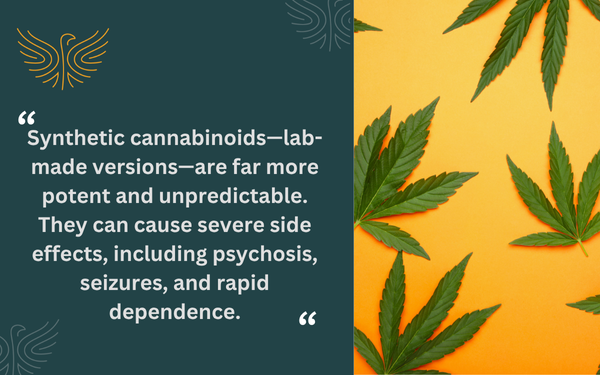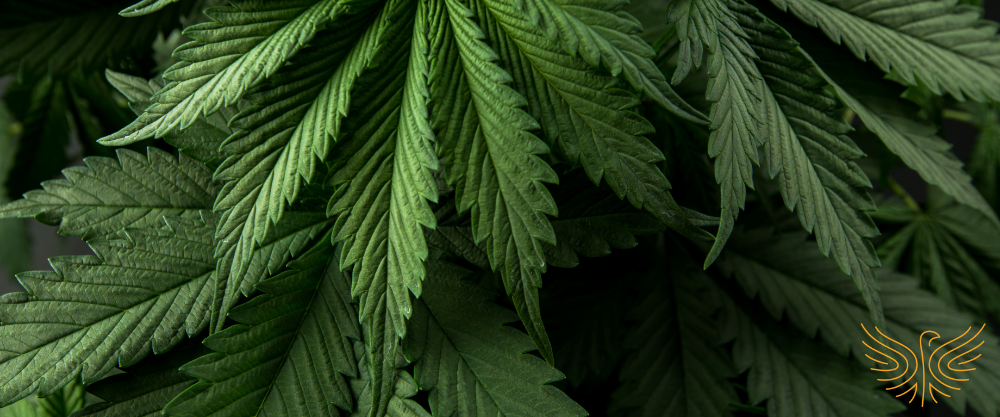From medical marijuana and CBD oils to hemp-derived compounds like delta-8 THC, cannabinoids are everywhere. They’re often marketed as natural, safe, and non-addictive ways to relax or find relief, and shifting laws have reinforced the idea that these substances carry little risk.
The truth, however, is more complex. While cannabinoids don’t carry the same addiction potential as opioids or alcohol, research shows that regular or heavy use can lead to dependence and withdrawal symptoms for some people.
With conflicting opinions, commercial interests, and genuine therapeutic uses in the mix, it’s easy to lose sight of the facts. So, let’s uncover what exactly cannabinoids are, how they affect the brain, and when use can cross into dependence—helping you make the most informed choices for your life.
_______________________________________________________
What Are Cannabinoids?
Cannabinoids are chemical compounds that interact with receptors throughout the body to influence mood, memory, pain, and sleep1. The cannabis plant contains over 100 types, but the best known are THC (tetrahydrocannabinol), which causes the “high,” and CBD (cannabidiol), which doesn’t produce intoxication and may have therapeutic effects.
The body has its own endocannabinoid system (ECS)—a network that helps maintain internal balance2. When cannabinoids from outside the body enter this system, they can alter its normal functioning. THC binds to CB1 receptors in the brain, triggering dopamine release in areas linked to pleasure, motivation, and reward. This is the same pathway involved in addiction to other substances.
Synthetic cannabinoids—lab-made versions—are far more potent and unpredictable. They can cause severe side effects, including psychosis, seizures, and rapid dependence3.

While some cannabinoids have legitimate medical uses, their effects on the brain’s reward system explain why regular or heavy use can lead to dependence for certain people.
_______________________________________________________
Can You Become Addicted to Cannabinoids?
Surprisingly, yes! While some believe this isn’t possible, there are certain factors to consider here, especially if you’re using cannabis regularly.
Cannabis Use Disorder (CUD)
Cannabis Use Disorder is a recognized medical condition listed in the DSM-5, not a matter of willpower or morality4. It occurs when regular cannabis use begins to harm health, relationships, or daily life.
Common signs include5:
- Strong cravings for cannabis
- Needing more to feel the same effects (tolerance)
- Withdrawal symptoms when stopping
- Failed attempts to cut down
- Continued use despite negative outcomes
Withdrawal is also very real—though usually milder than from alcohol or opioids. It can cause irritability, anxiety, insomnia, low appetite, and restlessness, often lasting a few weeks. However, support and professional guidance can make quitting safer and more manageable.
Psychological Dependence
Beyond physical addiction, psychological dependence on cannabinoids can be equally challenging to break.
Many individuals begin using cannabis to manage stress, anxiety, insomnia, or emotional pain. Over time, the brain begins to rely on cannabinoids for emotional regulation, making it increasingly difficult to cope with daily stressors without them. This psychological dependency often develops gradually and subtly, with users not recognizing their dependence until they try to stop.
The ritual and lifestyle aspects of cannabis use can also contribute to psychological dependence. Social circles, daily routines, and coping mechanisms become intertwined with use, making cessation feel like losing not just a substance but an entire way of life. This behavioral component of addiction can be as powerful as physical dependence, requiring comprehensive treatment approaches that address both psychological and social factors.
Synthetic Cannabinoids
Synthetic cannabinoids are lab-made compounds sold as “legal” alternatives to cannabis. They’re often sprayed on plant material and marketed under names like Spice or K2. Though they aim to mimic natural THC, they bind much more strongly to cannabinoid receptors—leading to intense and unpredictable effects.
Users may experience severe anxiety, paranoia, hallucinations, rapid heartbeat, seizures, or violent behaviour. Dependence can develop quickly—sometimes within days or weeks—and withdrawal can bring deep depression, anxiety, and suicidal thoughts. Because the chemical makeup keeps changing to evade laws, these substances are harder to predict and treat.
_______________________________________________________
Risks and Long-Term Effects of Heavy Cannabinoid Use
Chronic cannabinoid use can cause lasting effects on both brain and body6. Regular users may experience problems with memory, focus, and motivation. And these cognitive changes can affect work, school, and relationships, creating a cycle where people rely on cannabinoids to cope with difficulties partly caused by their use.
While some people turn to cannabis to manage anxiety or depression, long-term use can worsen these conditions. In fact, the main risks of heavy cannabinoid use include7:
- Impaired memory, concentration, and motivation
- Increased risk of anxiety, depression, or psychosis
- Disrupted brain development in adolescents and young adults
- Sleep disturbances and daytime fatigue
- Respiratory or cardiovascular strain (especially with smoking or vaping)
Although cannabinoids may not cause the severe physical addiction seen with opioids or alcohol, they can lead to strong psychological and behavioral dependence that interferes with daily functioning and emotional well-being.
_______________________________________________________
Getting Help for Cannabinoid Dependence
Many individuals hesitate to seek help for cannabinoid dependence, often feeling their problem isn’t serious enough to warrant professional treatment. In reality, any substance use that disrupts health, relationships, or daily life deserves attention. And early intervention often makes recovery easier and more successful.
Treatment begins with a comprehensive assessment to understand both substance use and the underlying issues driving it. Many individuals rely on cannabinoids to self-medicate for anxiety, depression, or trauma. Addressing these co-occurring conditions is essential for lasting recovery.
Treatment for cannabis addiction often includes:
- Cognitive Behavioral Therapy (CBT) to change thought and behavior patterns
- Motivational Interviewing to strengthen readiness for change
- Mindfulness and relaxation to reduce stress and anxiety in other ways
- Relapse prevention strategies to manage cravings and stress
Those dependent on synthetic cannabinoids may require medical detox to ensure safety and comfort during withdrawal. After stabilization, continued therapy, peer support, and healthy lifestyle changes help maintain progress.
Recovery isn’t only about stopping use—it’s about building a balanced, fulfilling life where substances are no longer needed to cope or find relief. At Freedom Recovery Centers (FRC), we’re here to help guide you; you don’t need to do this alone. Whether it’s your first or last time in rehab, our team will walk with you every step of the way. When you’re ready, call us at 804-635-3746.
.svg)






.svg)

.svg)



.svg)
